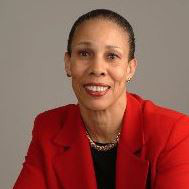
Lucy Brazier and Melba Duncan discuss her legacy, leadership, and the future of the Assistant profession
Melba Duncan is a name that commands immediate recognition and respect in the world of executive support. From her groundbreaking article in Harvard Business Review to her decades of advocacy and mentorship, she has redefined what it means to be an Assistant. As she prepares to launch her much-anticipated book, Indispensability, I had the privilege of speaking with her about her remarkable journey, her insights into the profession, and the legacy she hopes to leave behind.

A Legacy Rooted in Discipline and Purpose
Born in Jamaica and raised in Brooklyn, Melba’s upbringing was defined by dignity, discipline, and an unwavering focus on education. Her father, a scholar who studied at McGill University, instilled in his daughters a powerful message: “You are better than no one, but no one is better than you.” This philosophy would shape Melba’s approach to life and work.
Her early experiences taught her that discipline was non-negotiable. Her family emphasized proper conduct, from how one sat at a dinner table to how one walked down the street. “We had to learn how to live with integrity,” she recalls. These values became the bedrock of her career.
From Receptionist to Powerhouse EA
Melba’s career in administration began, like many others, humbly. A receptionist role at Continental Assurance opened the door, but it wasn’t long before senior leaders noticed her poise, capability, and agility. She was soon supporting executives directly, learning the nuances of communication, discretion, and strategic thinking.
Her trajectory led her to legendary financier Sanford C. Bernstein and later to Pete Peterson, former U.S. Secretary of Commerce and co-founder of the Blackstone Group. These high-pressure roles required more than administrative excellence – they demanded business acumen, emotional intelligence, and fearlessness. When Peterson asked her what she wanted to do next, her answer launched The Duncan Group, a retained executive search firm that has since become synonymous with excellence in placing high-level support professionals.
The Duncan Group and the Institute
The Duncan Group is unique in that it mirrors the prestige and rigor of executive searches typically reserved for C-suite positions. Melba’s firm insists on retained searches for Assistants – a deliberate move to elevate the status of the role and ensure candidates are treated with the same seriousness as their principals.
Beyond recruitment, the firm offers consulting, team assessments, and high-level training. The Duncan Group Institute, developed with faculty from Columbia University, delivers intensive six-day programs that blend strategic, managerial, and leadership training. “This is not just a job,” Melba insists. “It’s a profession.”
Defining Indispensability
Melba’s work focuses on a central idea: the Assistant role is indispensable – not because of routine tasks, but because of the strategic, emotional, and relational intelligence Assistants bring. “You make a serious mistake in this role, there’s a serious consequence,” she says. “Technology is a tool. But the Assistant is the relationship manager, the fixer, the strategist.”
She is passionate about the idea of Assistants owning their role as executive life managers. “You are responsible for everything that lands on your desk. From coordinating flights to ensuring a dog is picked up from daycare, it all matters because it enables your executive to operate at the highest level.”
This rebranding of the role is more than a semantic shift – it’s a mindset change. She’s deliberate about job titles because they shape perception. “Manager” is essential, she argues, because Assistants are indeed managing people, time, priorities, and outcomes.
The Harvard Business Review Effect
Her landmark HBR article, “The Case for Executive Assistants,” remains a cornerstone in the literature of the profession. Originally written at the request of an editor who heard her speak, Melba admits she never imagined it would have such a lasting impact. But its message – that Assistants are strategic assets – remains as urgent today as it was then.
She believes that much of the profession’s under-recognition stems from outdated perceptions. “Assistants are leaders. They just don’t know it,” she says. She encourages Assistants to shift from transactional thinking to strategic partnership, and to be bold in initiating conversations with their executives about priorities and goals.
Attributes of Indispensability
So, what makes an Assistant indispensable? For Melba, it starts with integrity. Confidentiality, trustworthiness, and judgment are non-negotiable. “There are things I never wrote down because they could hurt someone,” she explains. Other must-haves include:
- A sense of humor: To survive the unexpected with grace.
- Written communication: Every word matters; clarity and precision are essential.
- Cultural awareness: In a global world, how messages land matters just as much as what they say.
- Time management: Own your limits. Deliver on your promises – or communicate clearly when you can’t.
Melba also emphasizes the importance of courage and learning. Assistants must not be afraid to step forward, ask questions, and seek out development opportunities. “Know what you don’t know – and then go learn it.”
Her New Book: Indispensability
Melba’s upcoming book, Indispensability, is positioned as a manual for the future. Drawing on contributions from CEOs and her own extensive experience, it lays out a roadmap for the Assistant role – covering leadership, management, and strategic support. It includes case studies and explores the implications of not understanding the true nature of the role. “It’s not just about what to do. It’s about why it matters.”
The book also reflects on the changing workplace and what Assistants need to know to remain relevant and invaluable. “Helping someone else succeed is how you learn to be great yourself,” Melba says. The book is both philosophical and practical, aimed at reinforcing the profession’s credibility and power.
Advocacy and Social Justice
Melba speaks candidly about race, bias, and the societal forces that have shaped her life and career. A successful Black woman in a space still struggling with inclusion, she does not shy away from difficult truths. “Racism is in the water we drink in this country,” she says of the U.S. context. Yet her message is one of resilience, confidence, and action: “Don’t ever negotiate who you are for someone else.”
She encourages Black Assistants – and all marginalized professionals – to lead not with identity alone but with excellence. “Be the person that outpaces everyone,” she says. “And don’t apologize for it.”
The Role of the Assistant Today
Melba is clear-eyed about the evolution of the profession. She sees that Assistants often operate in isolation, across departments, lacking the community that other professional functions enjoy. But she believes the power lies in Assistants redefining the hiring conversation. “Ask: What is the culture here? Is there room for learning? How is the role seen?”
Career progression, she argues, should be built into the role from day one. Assistants should not feel locked into positions without development. “We need to create environments where Assistants are seen, heard, and offered the same respect as the executives they support.”
A Lasting Legacy
What does Melba hope her legacy will be? “That standing in a space of achievement and accomplishment is why we exist,” she says. “We have incredible brainpower. Use it. Reach for the sky. And help others do the same.”
For someone who has transformed the perception of the Assistant role and continues to mentor, teach, and challenge the profession to evolve, that legacy is already firmly in motion.
Melba Duncan is, and always will be, indispensable.
This article is a summary of the interview between Lucy Brazier and Melba Duncan, available on our YouTube channel as an #Adminchat. To view the interview in full, please click here.













